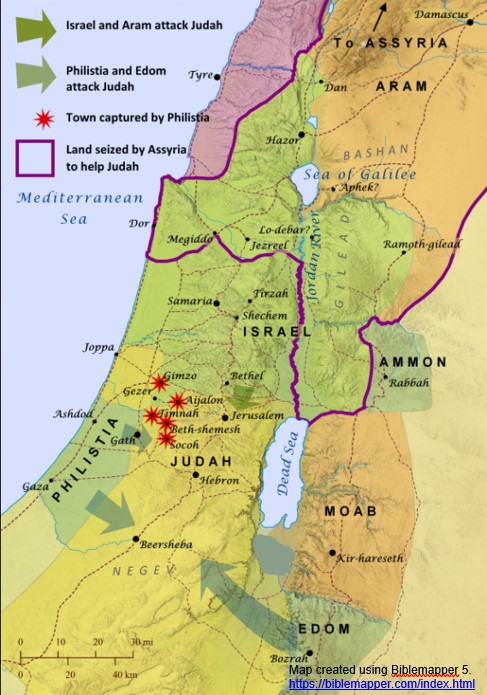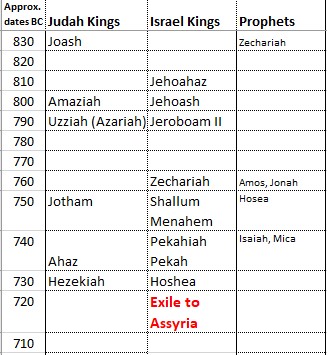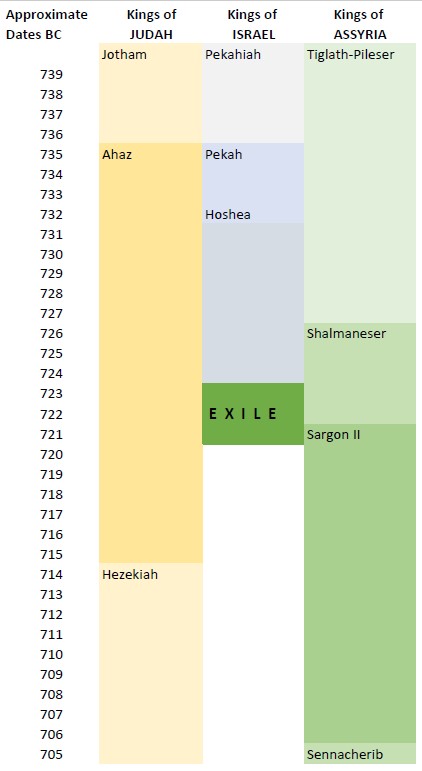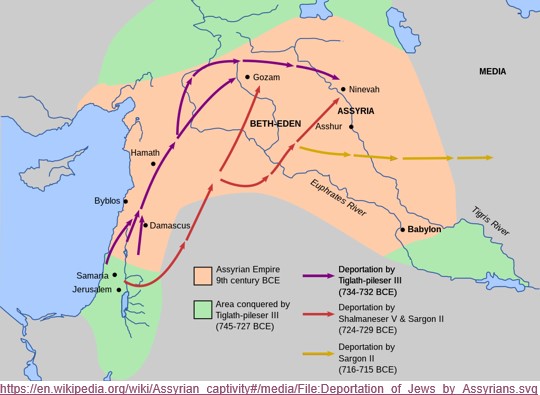In our last study we rushed through six kings of Israel, then a quick look at Uzziah of Judah. Then we had to look at 2 chronicles as 2 Kings had omitted the cause of Uzziah’s leprosy. We then finished with the start of Jotham’s reign in Judah
But we casually skipped over something that had happened in Israel that was important. Let’s just look at that again

Read 2 Kings 15:29-31
29 In the time of Pekah king of Israel, Tiglath-Pileser king of Assyria came and took Ijon, Abel Beth Maakah, Janoah, Kedesh and Hazor. He took Gilead and Galilee, including all the land of Naphtali, and deported the people to Assyria.
This was actually quite a large chunk of Israel, and was the beginning of the end.
Now read 2 Kings 15:32-38
32 In the second year of Pekah son of Remaliah king of Israel, Jotham son of Uzziah king of Judah began to reign. 33 He was twenty-five years old when he became king, and he reigned in Jerusalem for sixteen years. His mother’s name was Jerusha daughter of Zadok. 34 He did what was right in the eyes of the Lord, just as his father Uzziah had done. 35 The high places, however, were not removed; the people continued to offer sacrifices and burn incense there. Jotham rebuilt the Upper Gate of the temple of the Lord.
36 As for the other events of Jotham’s reign, and what he did, are they not written in the book of the annals of the kings of Judah? 37 (In those days the Lord began to send Rezin king of Aram and Pekah son of Remaliah against Judah.)
38 Jotham rested with his ancestors and was buried with them in the City of David, the city of his father. And Ahaz his son succeeded him as king.
What do you make of the verse in brackets, verse 37?
We have just been told that Jotham carried on as a faithful king of Judah, so why should the Lord encourage the unholy alliance of Pekah of Israel, and Rezin of Aram-Damascus to prepare to attack Judah?
Well of course, the Lord knew what was coming. After a run of Godly kings in Judah, Jotham’s son Ahaz turned out to be disastrously evil.

Read 2 Kings 16:1-4
1 In the seventeenth year of Pekah son of Remaliah, Ahaz son of Jotham king of Judah began to reign. 2 Ahaz was twenty years old when he became king, and he reigned in Jerusalem for sixteen years. Unlike David his father, he did not do what was right in the eyes of the Lord his God. 3 He followed the ways of the kings of Israel and even sacrificed his son in the fire, engaging in the detestable practices of the nations the Lord had driven out before the Israelites. 4 He offered sacrifices and burned incense at the high places, on the hilltops and under every spreading tree.
I have to ask why should he turn his back on God? As we have seen before, having a personal faith can be far removed from following a religion. Here Ahaz simply turned to a religion that seemed more attractive. How far removed was that from God’s intention for his holy people?
As we watch the unfolding of events over the intervening years, we need to remember that the Lord was not content to allow his people to slide inexorably into oblivion. He still had his hands on events (2 Kings 15:37), and like us looking in retrospect, he knew where the future course of world history would lead.
Read 2 Kings 16:5-6
5 Then Rezin king of Aram and Pekah son of Remaliah king of Israel marched up to fight against Jerusalem and besieged Ahaz, but they could not overpower him. 6 At that time, Rezin king of Aram recovered Elath for Aram by driving out the people of Judah. Edomites then moved into Elath and have lived there to this day.
The Aram-Damascus coalition was still a powerful force, and so far had largely been ignored by the Assyrian empire. Why is the Lord happy to allow Israel to join forces with them in order to attack Judah? (2 Kings 15:37) Was he allowing this one last raid to try to jolt his people into returning to him? But how confusing. If the Lord had encouraged the attack why was it not successful? Best we read on a bit.
Read 2 Kings 16:7-9
7 Ahaz sent messengers to say to Tiglath-Pileser king of Assyria, ‘I am your servant and vassal. Come up and save me out of the hand of the king of Aram and of the king of Israel, who are attacking me.’ 8 And Ahaz took the silver and gold found in the temple of the Lord and in the treasuries of the royal palace and sent it as a gift to the king of Assyria.
9 The king of Assyria complied by attacking Damascus and capturing it. He deported its inhabitants to Kir and put Rezin to death.
But it was only a few years before that, that the king of Israel had paid Tiglath-Pilezer 34 tons of silver to be on his side. The king of Assyria didn't care, so happily took this new bribe, and captured Damascus while its army was busy in Judah. The abortive attack on Judah disintegrated.
Aram-Damascus had been a buffer state between Israel and Assyria. Now it had gone and Assyria now totally surrounded what was left of Israel and Judah.
Read 2 Kings 16:10-16
10 Then King Ahaz went to Damascus to meet Tiglath-Pileser king of Assyria. He saw an altar in Damascus and sent to Uriah the priest a sketch of the altar, with detailed plans for its construction. 11 So Uriah the priest built an altar in accordance with all the plans that King Ahaz had sent from Damascus and finished it before King Ahaz returned. 12 When the king came back from Damascus and saw the altar, he approached it and presented offerings on it. 13 He offered up his burnt offering and grain offering, poured out his drink offering, and splashed the blood of his fellowship offerings against the altar. 14 The bronze altar that stood before the Lord he brought from the front of the temple – from between the new altar and the temple of the Lord – and put it on the north side of the new altar.
15 King Ahaz then gave these orders to Uriah the priest: ‘On the large new altar, offer the morning burnt offering and the evening grain offering, the king’s burnt offering and his grain offering, and the burnt offering of all the people of the land, and their grain offering and their drink offering. Splash against this altar the blood of all the burnt offerings and sacrifices. But I will use the bronze altar for seeking guidance.’ 16 And Uriah the priest did just as King Ahaz had ordered.
I feel sorry for Uriah. The king would simply replace him if he disobeyed, and surely building a ‘large new altar’ to replace the old one wasn’t that wrong? He chose not to ask questions. The design and construction of the original altar had been dictated to Moses by God himself (Exodus 20:24-26, Exodus 25:1 to 27:1). It was to be 4½ feet high, 7½ feet long and wide, and made of wood.
The bronze altar built by Solomon was (2 Chronicles 4:1) 30 feet long and wide, and 15 feet high but again the plans had been given to David by God’s spirit (1 Chronicles 28:19).
Here Uriah has been commissioned to copy an attractive pagan altar (probably at the temple of Hadad, the storm god) seen by the king in Damascus. And it wouldn’t totally replace the old altar – that would just be moved out of the way and the king would still use it ‘for seeking guidance’ – really? What guidance and from whom has he been listening to so far? Notice in verse 14 that the old altar ‘stood before the Lord’ – to which god would the sacrifices made on this pagan altar be offered?
Read 2 Kings 16:17-18
17 King Ahaz cut off the side panels and removed the basins from the movable stands. He removed the Sea from the bronze bulls that supported it and set it on a stone base. 18 He took away the Sabbath canopy that had been built at the temple and removed the royal entrance outside the temple of the Lord, in deference to the king of Assyria.
Obviously the king of Assyria was displeased with some of the current articles in the Temple in Jerusalem. Washing was obviously not needed, so perhaps the moveable stands could be recycled. And as the image normally associated with the god Hadad was a bull, to depict them as beasts of burden was most inappropriate. And the close association between King and God, Palace and Temple should be discouraged. As we will see, the doors to the Temple itself were to be kept closed.
Having turned his back on God, and subjected himself to Tiglath-Pileser (Whose obvious intention was to take over all the nations at the eastern end of the Mediterranean), he could enjoy the rest of his life in peace.
Read 2 Kings 16:19-20
19 As for the other events of the reign of Ahaz, and what he did, are they not written in the book of the annals of the kings of Judah? 20 Ahaz rested with his ancestors and was buried with them in the City of David. And Hezekiah his son succeeded him as king.
As you can see from this more detailed chart, we need to go back to see what had been going on in Israel.

When Pekah joined forces with Damascus in his abortive attack on Judah, Tiglath-Pileser stepped in, won the battle and deported the people of Damascus, but he allowed Pekah to go free – Why? From the time of Pekah’s grandfather, Israel had become a vassal state. His little war had been allowed in order to assist Assyria’s greater ambitions. 2 Kings 16:7 tells us that Ahaz (Judah) was now also Assyria’s vassal.
As we saw at the beginning of this study (2 Kings 15:30, Pekah didn’t last long – he was assassinated by Hoshea.
So now we can move into chapter 17
Read 2 Kings 17:1-6
1 In the twelfth year of Ahaz king of Judah, Hoshea son of Elah became king of Israel in Samaria, and he reigned for nine years. 2 He did evil in the eyes of the Lord, but not like the kings of Israel who preceded him.
3 Shalmaneser king of Assyria came up to attack Hoshea, who had been Shalmaneser’s vassal and had paid him tribute. 4 But the king of Assyria discovered that Hoshea was a traitor, for he had sent envoys to So king of Egypt, and he no longer paid tribute to the king of Assyria, as he had done year by year. Therefore Shalmaneser seized him and put him in prison. 5 The king of Assyria invaded the entire land, marched against Samaria and laid siege to it for three years. 6 In the ninth year of Hoshea, the king of Assyria captured Samaria and deported the Israelites to Assyria. He settled them in Halah, in Gozan on the River Habor and in the towns of the Medes.
We started this study by reading 2 Kings 15:29.
29 In the time of Pekah king of Israel, Tiglath-Pileser king of Assyria came and took Ijon, Abel Beth Maakah, Janoah, Kedesh and Hazor. He took Gilead and Galilee, including all the land of Naphtali, and deported the people to Assyria.

It seems that as Assyria’s vassal, Pekah could do nothing about it. Maybe it was this apparent weakness that had triggered his assassination by Hoshea. Perhaps following the death of Tiglath-Pileser, Hoshea now felt he would be able to resist Assyria’s new king Shalmaneser.
Hoshea obviously had no concept of the might of Assyria, or the fragmented nature of the small area of Egypt that Pharaoh So (Osorkon IV) now ruled over, who he relied on for help.
It was a bad mistake, and we hear no more of Hoshea. Worse than that, he had deliberately turned his back on God, and so it was now time for God’s warnings (v13) to be fulfilled and the Land of Israel was no more.
Read 2 Kings 17:7-23 (This will be a long passage without comment – best to share the reading amongst several volunteers.)
7 All this took place because the Israelites had sinned against the Lord their God, who had brought them up out of Egypt from under the power of Pharaoh king of Egypt. They worshipped other gods 8 and followed the practices of the nations the Lord had driven out before them, as well as the practices that the kings of Israel had introduced. 9 The Israelites secretly did things against the Lord their God that were not right. From watch-tower to fortified city they built themselves high places in all their towns. 10 They set up sacred stones and Asherah poles on every high hill and under every spreading tree. 11 At every high place they burned incense, as the nations whom the Lord had driven out before them had done. They did wicked things that aroused the Lord’s anger. 12 They worshipped idols, though the Lord had said, ‘You shall not do this.’
13 The Lord warned Israel and Judah through all his prophets and seers: ‘Turn from your evil ways. Observe my commands and decrees, in accordance with the entire Law that I commanded your ancestors to obey and that I delivered to you through my servants the prophets.’
14 But they would not listen and were as stiff-necked as their ancestors, who did not trust in the Lord their God. 15 They rejected his decrees and the covenant he had made with their ancestors and the statutes he had warned them to keep. They followed worthless idols and themselves became worthless. They imitated the nations around them although the Lord had ordered them, ‘Do not do as they do.’
16 They forsook all the commands of the Lord their God and made for themselves two idols cast in the shape of calves, and an Asherah pole. They bowed down to all the starry hosts, and they worshipped Baal. 17 They sacrificed their sons and daughters in the fire. They practised divination and sought omens and sold themselves to do evil in the eyes of the Lord, arousing his anger.
18 So the Lord was very angry with Israel and removed them from his presence. Only the tribe of Judah was left, 19 and even Judah did not keep the commands of the Lord their God. They followed the practices Israel had introduced. 20 Therefore the Lord rejected all the people of Israel; he afflicted them and gave them into the hands of plunderers, until he thrust them from his presence.
21 When he tore Israel away from the house of David, they made Jeroboam son of Nebat their king. Jeroboam enticed Israel away from following the Lord and caused them to commit a great sin. 22 The Israelites persisted in all the sins of Jeroboam and did not turn away from them 23 until the Lord removed them from his presence, as he had warned through all his servants the prophets. So the people of Israel were taken from their homeland into exile in Assyria, and they are still there.
That last phrase is very telling. We know from the New Testament that people from Samaria and old ‘Israel’ (Samaritans) were considered by the Jews to be a semi-Gentile people and they would have nothing to do with them. We will find out why in our next study.







